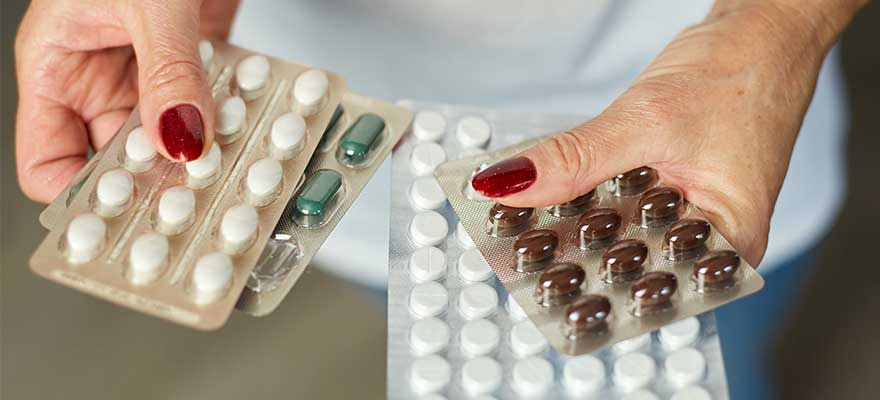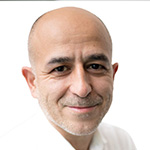Medication Side Effects vs TPS-Therapy
Physicians call for more responsible use of psychotropic drugs in dementia patients
How safe is Transcranial Pulse Stimulation for people suffering from Alzheimer’s dementia, Parkinson’s disease, and other neurodegenerative disorders? This question was investigated – we reported earlier – by Viennese researchers at the Medical University of Vienna, Department of Neurology, as part of the large placebo-controlled Transcranial Pulse Stimulation trials currently underway. Sonja Radjenovic et. al. published their results now in the renowned scientific journal “Brain Sciences”. Conclusion: Transcranial Pulse Stimulation is a safe and well-tolerated therapy method that leaves no side effects.
What we experience in the daily use of Transcranial Pulse Stimulation in medical practices is now also increasingly supported by clinical studies and their data: TPS is an effective and safe treatment method, which – apart from the high therapeutic benefit – is furthermore almost always pleasant for the patient:s and without side effects or after-effects. This is another reason why Transcranial Pulse Stimulation stands for an optimal alternative that can also contribute to possibly adjusting medication administration, which is usually accompanied by strong and multifaceted side effects, differently in the future.
In dementia and Parkinson’s disease: cross-indication medication unfortunately still standard today
The current standard of care for people with Alzheimer’s disease, other dementias, or Parkinson’s disease is drug therapy. Antidementia drugs are supposed to be able to halt the course of the disease and improve cognitive abilities at least slightly. In fact, antidementia drugs belong to the group of psychotropic drugs, i.e., drugs that influence metabolic processes in the brain and central nervous system and alter the mental state of those affected.
In addition, there is the group of so-called neuroleptics, which were developed for the treatment of psychoses. These drugs are used to treat psychoses, which are mental disorders in which the affected person perceives or processes reality differently. Neuroleptics are therefore antipsychotics that are often administered to dementia patients, especially in nursing homes, to counteract aggression, restlessness and sleep disorders. The problem is that many of these drugs are not approved for use in dementia, but are nevertheless used. They also increase mortality and promote the tendency to fall. Two preparations from this group, risperidone and haloperidol, have limited approval for moderate to severe Alzheimer’s dementia, but only if there is very strong belligerence and aggressiveness.
That psychotropic drugs can often have undesirable, sometimes massive, side effects is well known. Psychotropic drugs are now among the most frequently prescribed drugs for dementia – too often and too much in the dosage, as experts have long complained and therefore warn against too frivolous use.
Memantine, donepezil, rivastigmine & Co. – Scientific data situation unclear
Briefly ahead: Drugs that are used to influence the course of the disease in dementia patients – we leave the situation regarding neuroleptics aside here, as this deserves its own treatise – are divided into two groups: Donepezil, rivastigmine and galantamine, for example, belong to the acetylcholinesterase inhibitors, i.e. they are designed to inhibit the action of the enzyme “acetylcholinesterase” (AChE). In Alzheimer’s dementia, there is a deficiency of the neurotransmitter acetylcholine due to the degradation of nerve cells, which these drugs are designed to compensate for.
Memantine, on the other hand, is classified as a centrally acting muscle relaxant (it reduces muscle tone) and is a so-called “NMDA receptor antagonist” or “glutamate antagonist”. Since an excessive concentration of glutamate in the brain is also responsible for the death of nerve cells, memantine is supposed to dampen the overexcitation of nerve cells in the brain, among other things.
All of these active ingredients have been pharmacologically tested and approved for certain indications, although the boundaries in their use are fluid. However, their effects in the field of dementia or Parkinson’s disease have not been clearly scientifically proven. The studies on memantine, for example, are quite thin. Most statements are limited at most to a six-month treatment period, during which a delayed decline in mental performance was observed in one out of ten test subjects (!). There is no scientific evidence that patients with moderate or severe Alzheimer’s dementia benefit from drugs containing the active ingredient memantine, the German Institute for Quality and Efficiency in Health Care (IQWiG) concluded in a final report in 2009. Since then, no striking new findings have emerged in research on memantine.
Efficacy and side effects: More harm than good?
Whether the aforementioned agents can halt the progression of Alzheimer’s dementia or Parkinson’s disease for months or even a year cannot be clearly established, and whether they can improve quality of life, alleviate accompanying psychological symptoms such as depression or anxiety, or delay the point at which full inpatient care (i.e., nursing home care) becomes necessary has not been clarified or proven.
The data on side effects, however, are clear: the most common “adverse drug reactions encountered” with memantine are dizziness, headache, constipation, drowsiness, and elevated blood pressure. Side effects such as nausea, vomiting, and dizziness can also occur with donepezil, rivastigmine, and galantamine. They occur more frequently the higher the dose. Thus, depending on the active ingredient, about one to three out of 10 people get sick from the drugs or get diarrhea. In addition, there are side effects such as cardiac arrhythmias, heart attacks, states of agitation, hallucinations, muscle tremors, gait and speech disorders, and strokes. Increased deaths in the course of studies also occurred.
Probably for this reason, risperidone, for example, may be used, according to the drug regulatory agency, only when nondrug therapies have not worked and when sufferers could endanger themselves or others.
40% of all dementia sufferers receive antidementia drugs and antipsychotics
Many experts consider the use of psychotropic drugs in neurodegenerative diseases to be of high concern. In a recent interview dated September 26, 2022, the magazine “Apotheken Umschau” spoke with psychiatrist Dr. Sarah Kohl of Munich’s Klinikum rechts der Isar about the use of sedative psychotropic drugs in dementia. Dr. Kohl considers this practice to be questionable and wants to reduce the use of calming or sedating psychotropic drugs in people with dementia. In this interview, she summarizes the current situation and makes the case for more responsible and conscious use of psychotropic drugs in people with dementia: https://www.apotheken-umschau.de/pflege/pflegetipps/psychopharmaka-bei-demenz-dauerhafte-gabe-ist-ein-problem-898291.html
Transcranial Pulse Stimulation: clearly effective and ultimately free of side effects
In contrast, Transcranial Pulse Stimulation is a treatment method that has been increasingly tested and studied scientifically: The low-frequency shock wave pulses do not infiltrate the human organism like medicinal agents, which can influence all metabolic processes in the body in many ways – undesirable changes in metabolism included.
Instead, TPS activates and promotes the regenerative capacity of the brain and is thus a purely supportive procedure for the body’s own regulatory processes. In the meantime, researchers at the Medical University of Vienna have been able to prove this, thus confirming the thousands of experiences made in clinics and practices working with TPS, in which neither the physicians nor the patients or their relatives have ever noticed very brief light headaches or dizziness (see also: https://www.alzheimer-deutschland.de/aktuelles/kurzmeldungen/neue-daten-tps-therapie-sicher-gut-vertraeglich ).
In this context, Transcranial Pulse Stimulation is an additive form of treatment that is ergo used as a complementary measure to the patient:s existing medication. In order for those affected to benefit maximally from all available medical options, it would be desirable if particular care were taken in the choice and dose of medication and if TPS were, after all, added as a complementary therapeutic option.
Sources:
https://www.iqwig.de/presse/pressemitteilungen/pressemitteilungen-detailseite_10949.html


